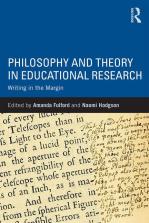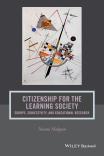Featured in the Special Issue of the Journal of Philosophy of Education to mark the 50th anniversary conference of the PESGB, this article was co-written with Amanda Fulford (Leeds Trinity University). The abstract is shown below:
ABSTRACT The notions of literacy and citizenship have become technologised through the demands for measurable learning outcomes and the reduction of these aspects of education to sets of skills and competencies. Technologisation is understood here as the systematisation of an art, rather than as intending to understand technology itself in negative terms or to comment on the way technology is used in teaching and learning for literacy and citizenship. Technologisation is approached here in terms of the understanding of literacy and citizenship as things (qualities, sets of skills) that one has. Drawing on the phenomenology of Gabriel Marcel the understanding of literacy and citizenship in terms of having is problematised, as is the distinction between having and being. This opens the way for a richer understanding of being literate and being a citizen explored through the figures of the Hermit and the Poet in Thoreau’s Walden. Being literate and being a citizen are brought together here in order to consider the implications of their technologisation for academic writing in the university. The question of what we write in the name of in the university is considered in the light of this and of a particular notion of the public.

